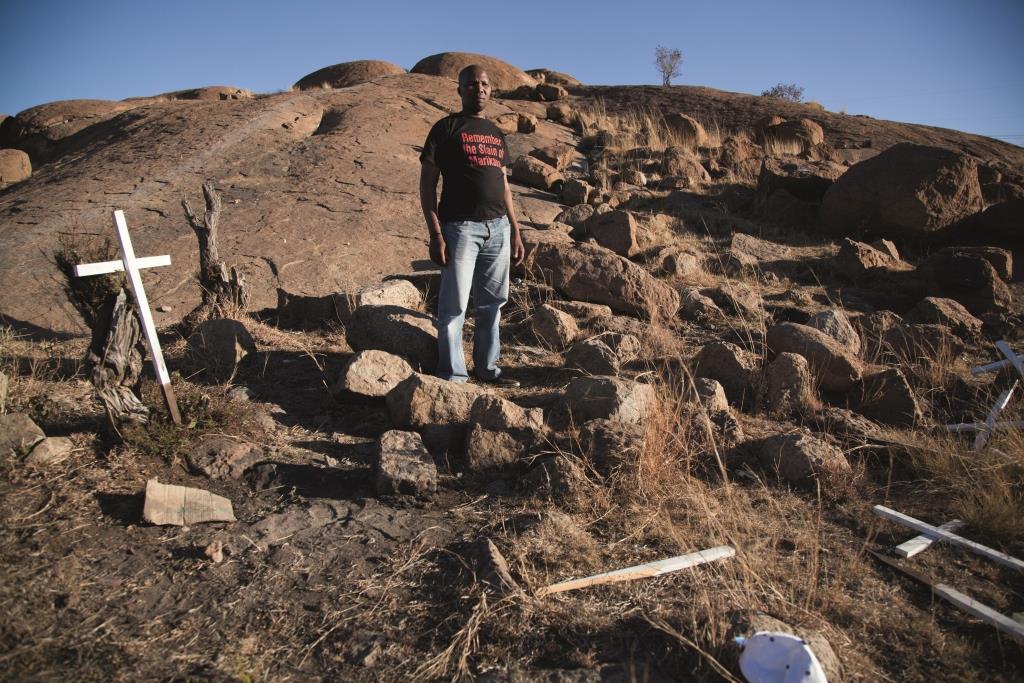On a dirt road, outside the mining shafts of Lonmin, 120 kilometers north west of Johannesburg there are 34 white crosses.
Days before the first anniversary of Marikana, miners ripped them up and threw them among the nearby rocks. The beating sun and biting wind eats at their enamel sheen.
A South African opposition party put up these crosses to commemorate the bloodbath. A year on, rock drill operator Siphiwe Booi, who has worked in the depths of Lonmin’s mine for 23 years, is tearing them down.
“The DA [Democratic Alliance] put these crosses up, not us [the miners]. It was a ploy to win votes. We are going to surround this hill with a fence and put up a headstone with all the names of those who fell. Us. The miners,” says Booi.

Head of the Marikana Commission, Ian Farlam, leaves after postponing proceedings again
Loading...
In many ways the rise and fall of the crosses is one of the precious few manifestations of change in the post-Marikana world.
Miners, such as Booi, want justice rather than memorials, for the 34 miners who died on August 16, 2012, in a wildcat strike.
“I woke up that day to find the verdict of the wage negotiations. Little did I know, I was waking up to death. I remember the line of police shouting: ‘Media get back’. The police stepped forward in a line. Then the sound came: ta-ta-ta-ta. The next I saw was a man in a Bafana Bafana shirt dropping next to me,” says Booi.
He fumbles in his jeans and pulls out a cellphone. He points to a picture.
“This was my friend, my work colleague, that was August 16,” he says.
Booi feels nothing has changed since that day. He is also one of the many witnesses who stood in the hallway of the Farlam Commission, an hour-and-a-half drive from his home in Marikana West. The commission, in Centurion near Pretoria, was charged by President Jacob Zuma to find out who was to blame for Marikana.
On the same day Booi was pulling up the crosses, the families of mine workers and police alike rubbed shoulders, a world away, at the commission. They sat, ringed by cameramen, united by the need for closure. Among suits, laptops and lever arch files the truth is expected to emerge.
The commission has sent a year sifting through 12,000 pages of statements, inspections, video footage and evidence. The end, expected on October 13, is nowhere in sight. The commission has not moved at the speed he wished, admits Ian Farlam, head of the commission and retired Supreme Court judge, days before the anniversary.
The delay has been hard for Lizy Maubane, sister of one of the policemen who was killed on August 13 2012. Since his death she has been depressed, at times suicidal. All she wants is closure.
Accusations of unequal funding have also delayed the commission, admits Farlam.
Advocate Dali Mpofu, who represents the injured miners, walked out of the commission after he was not paid. The miners must pay R400,000 ($40,000) a month for Mpofu’s services. The tax payers collect a R36 million ($3.6 million) bill for the defense of the police.
Mpofu refuses to defend the miners until he has taken the matter to the South African Constitutional Court. Here, he hopes to be granted state funds.
The 12 parties at the commission are allowed to cross-examine each witness—testimony that has to be heard in several languages. This is an issue, says Farlam.
“With so many witnesses and cross-examinations it was inevitable that the process would not be rapid,” he says.
The good news is that the commission has been granted funds to install a simultaneous translation device, which will speed up the fact checking process, says Farlam.
In the interim, Farlam is eager to push through with proceedings, hoping a secret financial backer can pay Mpofu’s bill. A large scale walkout could spell disaster.
“I just want to say one thing to the government, please pay the lawyers,” says Booi.
The mining industry is also struggling, post Marikana. According to the Chamber of Mines, 60% of the gold mines in South Africa are unprofitable. Costs are rising amid the threat of more wildcat strikes. Even the time honored pay negotiations are in dispute and disarray.
For the miners, who sweat underground, the future of mining is a far away concept. They are too busy struggling to live. At the very least in Centurion, it’s the lawyers, wearing suits that cost more than a year’s wages in the mines, that have the job of unearthing the truth so that justice can be done.
Loading...
